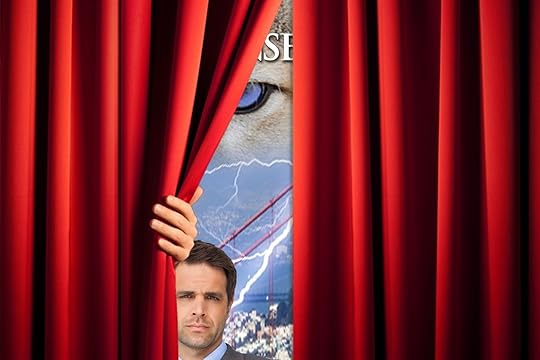S. Evan Townsend's Blog, page 112
April 1, 2014
Coming Soon: Cover Reveal for Gods of Strife
Published on April 01, 2014 06:00
March 31, 2014
Are Adverbs Justly Verboten?
 When it comes to writing, I am pretty much a lonely autodidact. I greatly suspect a lot of writers are, also. I have no formal "creative writing" training, I basically taught myself through trial and error and reading great writers. So when I was told at my local writers' group I shouldn't use adverbs (or -ly words as they are sometimes called) I was suddenly surprised.
When it comes to writing, I am pretty much a lonely autodidact. I greatly suspect a lot of writers are, also. I have no formal "creative writing" training, I basically taught myself through trial and error and reading great writers. So when I was told at my local writers' group I shouldn't use adverbs (or -ly words as they are sometimes called) I was suddenly surprised.Then it was explained that because beginning writers tend to thoroughly over-use them, they are told not to use them at all but if you're an experienced writer you can "let a few slip in." And, to be honest, since hearing this advice, I have strived diligently to minimize their use. I especially like to avoid using them in "said" sentences such as " . . . he said sadly" or " . . . she said happily."
But I think eliminating them completely is a mistake.
When I write I really like to use powerful words that paint an image. If I, for instance, want to say:
Joe tripped and fell.I will tend to say:
Joe stumbled, lost his balance, and was slapped to the cold, hard concrete.To me that paints a much better picture. But, also to me, that sentence needs one more word to make it nearly perfect:
Joe stumbled, lost his balance, and was painfully slapped to the cold, hard concrete.Yes, an adverb! A modifier to describe the verb "slapped" to me adds so much more to that sentence. And if I try to eliminate the adverb, I have to use some clunky construction such as:
Joe stumbled, lost his balance, and was slapped to the cold, hard concrete with a lot of pain.Yuck.
My advice is to use adverbs sparingly and to the greatest impact possible. There are a lot better ways to indicate someone is sad than say " . . . he said sadly." And this gets into the "show don't tell" part of writing (oh, perhaps another blog post is warranted). Instead of saying he said it sadly, show that he was sad. You could write " . . . he whimpered, his eyes full of tears."
Now, I did break my own rule. In my novel to be released May 15th, Gods of Strife , I have a line:
"Apparently the lady doesn't wear underwear," the hotel dick said lecherously.But the scene was such that I didn't feel it would have been completely appropriate to spend an inordinate amount of time explaining the hotel detective's lechery.
I don't think adverbs are an evil never to be used. I think their judicial use is justified in good writing.
And yes, I purposely put a lot in this blog post.
Published on March 31, 2014 05:00
March 28, 2014
Capricious Northwest Weather
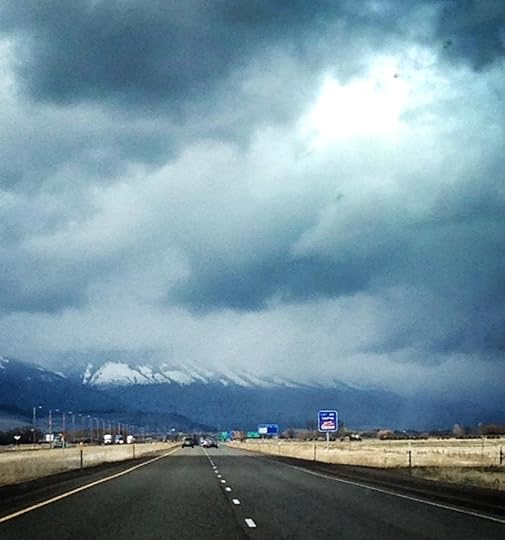 Blue Mountains from the East (picture by Lynn D. Townsend)My wife and I traveled to Southeast Idaho this week to visit friends (well, friends of mine). Since I'd taken the snow tires off the car and put on "summer" tires (not all-season radials) I was a little worried about weather even this late in the year. The Pacific Northwest can have capricious weather, and has especially this year.
Blue Mountains from the East (picture by Lynn D. Townsend)My wife and I traveled to Southeast Idaho this week to visit friends (well, friends of mine). Since I'd taken the snow tires off the car and put on "summer" tires (not all-season radials) I was a little worried about weather even this late in the year. The Pacific Northwest can have capricious weather, and has especially this year.The drive down the weather was beautiful. The sky was blue, the roads were bare and dry, I set the cruise control at 5 mph over the speed limit (65 in Oregon, 75 in Idaho) and cruised. While we were in the Pocatello area, the weather got worse and I was keeping a wary eye on the forecast for the Blue Mountains. This was the highest (in altitude) part of the journey. There is also a very steep, winding downhill grade from the west side of the Blue Mountains into the Columbia Basin near Pendleton, Oregon. If it's snowy and slick, it is one of the most white-knuckle places you can drive that I know of.
The weather forecast for yesterday (Thursday) in the Blue Mountains was rain and snow mixed. But temperatures were supposed to be above freezing so I was hoping for more rain than snow. On high-performance Goodyear Eagle summer tires.
When we left Pocatallo it was snowing but the road was just wet. I went a little slower than my customary 5 mph over the 75 mph speed limit and got passed by a cop. Between Pocatello and La Grande, Oregon (just to the east of the Blue Mountains), we had snow, rain, sleet, and sunshine with bare roads. We stopped at Starbucks in La Grande (big surprise) because my wife wanted some caffeine (and to be honest, so did I). We got back in Interstate 84 and almost immediately, as if someone had turned on a faucet, it started raining steadily. But soon it turned to hard rain and we even went through a mercifully short bit of hail. There were puddles on the road because of the hard rain and the car would hydroplane. I clicked of the cruise control and drove "as fast as I dared" which was usually under the speed limit.
Then, as if someone shut off a faucet, it quit. We were under blue skies with a smattering of clouds and the road was damp but dry where everyone had driven. I told my wife that if that was the worst of it, that wasn't so bad.
But we came over a hill and could see more weather ahead of us. "Looks like a mist," my wife said. "Looks like snow," I said, being more experienced with winter weather. And it was snow. The temperature as indicated by my car's thermometer plummeted quickly. At first the road was just wet. Then slush started creeping in from the sides. Soon the temperature hit 33F (0.5C) and slush covered most of the road except for two bare ruts in the right lane where people were driving. Everyone lined up in that lane even though it was only moving at about 30 mph (50 kph).
This went on for miles, and once I swear there was hail mixed in with the snow (or the snow got really hard). We passed over the summit of the blue mountains at 4,193 feet (1,278 m). Going down things improved, the road became clearer and I dared to cross the slush between lanes and start passing people going about 55 mph (90 kph).
Just as we got to the beginning of the down grade, I noticed a bunch of vehicles clogging the road ahead following a snowplow and seeming reluctant to pass it. The road was bare and wet with some slush at this point and the snow almost stopped. We could see into the Columbia Basin where it was sunny. The temperature began to rise and people started passing the plow.
Not long after we were down on the straight, flat road heading into Pendleton and the temperature was almost 60F (16C). And I thought about what they used to tell me when I lived in Idaho: if you don't like the weather, wait 15 minutes, it'll change. Or in this case, travel 10 miles out of the Blue Mountains.
Published on March 28, 2014 09:00
March 20, 2014
Why Do You Write?
 Why?
Why?Why sit in front of a computer, eschewing human contact, consuming coffee, and making up stories in your head to type into an electronic file?
Why do you write?
You're probably not going to get rich. Chances are you're not one of the lucky few who make it big with indie publishing. Chances are you're not going to sign with a major publishing house and have a million selling book that gets picked up for a movie and the movie is a huge hit and causes even more book sales and the movie starts Jennifer Lawrence who gives you a big hug at the premier party. Probably not going to happen.
So why do you write?
I've been writing since I was twelve years old. I'm now 53. You do the math. Why do I write? Because I cannot not write. Even when I was spending 50 - 60 hours a week in the corporate world, I spent an hour or two writing nearly every day. As I read it described, there are things in my head that demand being written. I write because I love it.
Why do you write? Why motivates you? If it's fame and fortune, good luck. I hope you write because, like me, you have to. I hope you write for the love of it. I hope you write because there are ideas bursting from your head that demand to be written. Yes, it's great when you make some money. It's wonderful to have strangers read your books. It's lovely to get great reviews. None of that should motivate you. You should be writing because you love to write, need to write, crave to write.
It's true, I would still be writing even if I'd never sold a book. I write for the love of the craft.
Why do you write?
Published on March 20, 2014 07:30
March 19, 2014
I Invented eBooks and Indie Publishing . . . Sorta
 Yes, I, S. Evan Townsend, invented ebooks and indie publishing.
Yes, I, S. Evan Townsend, invented ebooks and indie publishing.Well, sort of.
About ten years ago I was selling stuff on eBay. It was mostly old electronics I no longed had a need for because I'd upgraded. But it got me thinking, what if I could see my book on eBay. At the time I only had one finished book, Rock Killer . But here was my thought process: I could sell directly to the readers and cut out the gatekeepers at the publishing houses who only seemed to want to publish stuff by established writers or authors who had agents. I could convert the Word file of Rock Killer to a PDF and sell it on eBay. Since the marginal cost of the PDF file was essentially zero, even if I sold it for 99 cents I'd be ahead.
The problem I saw was getting the attention of the readers (this was before most social media).
Then I had an idea that I should make a website called storytellers.com (except that URL was taken) and allow other writers up upload their books, convert them to PDF, and sell them directly to readers, the website taking a small cut. And readers could leave reviews to help weed out the crap. Does this sound familiar?
The only problem was I was working more than full time at my job and could see this costing a lot.
So, circa 2004 I invented ebooks (as PDFs) and indie publishing. I just didn't do anything with either idea. Now there's Wattpad which is a lot like my storytellers.com idea only readers don't pay. And Amazon took the ebook concept further with the Kindle ereader and indie publishing has taken off with ereaders and print-on-demand technology.
Which I suppose is a lesson in, if you have a good idea, run with it.
Published on March 19, 2014 07:00
March 18, 2014
Movie Review: The Hunger Games: Catching Fire
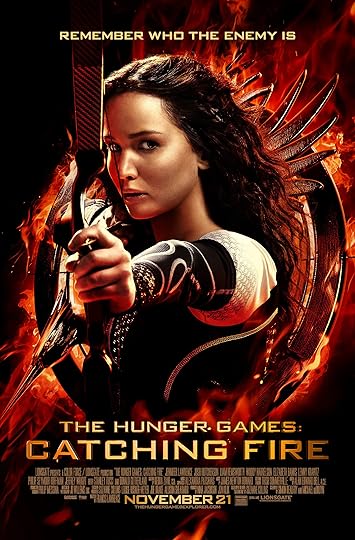 I was not impressed with the first
Hunger Games
movie. The plot, such that is was, seemed to be an excuse for having teenagers trying to kill each other in the long, brutal climatic end. Now I haven't read any of the books (so many books, so little time) and I have heard the book goes into the politics of the "Hunger Games" and shows how they are used to manipulate the populace of this totalitarian government of the country of Panem (which seems to sit where the United States is now). But the movie didn't and it was plenty long and at times boring. And the fight to the death at the end between teenagers frankly made me uncomfortable.
I was not impressed with the first
Hunger Games
movie. The plot, such that is was, seemed to be an excuse for having teenagers trying to kill each other in the long, brutal climatic end. Now I haven't read any of the books (so many books, so little time) and I have heard the book goes into the politics of the "Hunger Games" and shows how they are used to manipulate the populace of this totalitarian government of the country of Panem (which seems to sit where the United States is now). But the movie didn't and it was plenty long and at times boring. And the fight to the death at the end between teenagers frankly made me uncomfortable.The Hunger Games: Catching Fire I enjoyed a lot more because it went into the machinations of the government, showed how brutal and totalitarian it was, and explained more why there were the Hunger Games as a tool to demonstrate state power over its citizens. And while the climax was another Hunger Game, fight to the death, they twisted it (what one character called "a wrinkle") and made it have much more depth and be a lot more interesting. You never quite know who is on what side between the state, the rebellion, and the heroine, Katniss Everdeen.
In the first move, Katniss Everdeen was just angry the entire time and I really wondered if
In addition, there is President Snow, the dictator of Panem, played with delicious evilness by Donald Sutherland. And this movie was probably one of Philip Seymour Hoffman's last performances and he plays the designer of the Hunger Games very well (as always). Catching Fire is a much better movie than its predecessor. The 2:23 minute run time flies by (of course, there's over 10 minutes of credits) and for the first time I feel compassion about these characters. I'm looking forward to the third movie (and the fourth, apparently).
Published on March 18, 2014 10:21
March 17, 2014
"Adult" Content
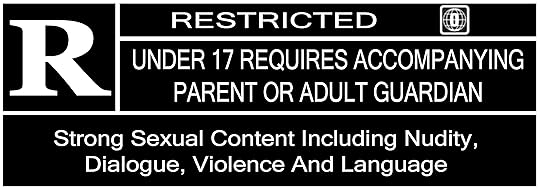 The other day I noticed on my DVR's programming grid that Turner Classic Movies (TCM) was going to show
Captain Blood
. It's been years since I've seen Captain Blood and I remembered it as a fun, entertaining old movie (made in 1935) that made a star out of Errol Flynn and introduced Olivia de Havilland to the world. So, of course, I recorded it and watched it a few days later. And yes, it was just as fun and good as I remembered, based on historical fact (with a few liberties thrown in) and a fun movie. But I realized that there was zero sex (some slight hinting at prostitution) and the violence was bloodless and more of the bang-bang-you're-dead type or more hinted at than shown. It certainly wasn't like the violence one sees in movies today. Captain Blood was a movie I wouldn't have qualms about showing to a 10-year-old.
The other day I noticed on my DVR's programming grid that Turner Classic Movies (TCM) was going to show
Captain Blood
. It's been years since I've seen Captain Blood and I remembered it as a fun, entertaining old movie (made in 1935) that made a star out of Errol Flynn and introduced Olivia de Havilland to the world. So, of course, I recorded it and watched it a few days later. And yes, it was just as fun and good as I remembered, based on historical fact (with a few liberties thrown in) and a fun movie. But I realized that there was zero sex (some slight hinting at prostitution) and the violence was bloodless and more of the bang-bang-you're-dead type or more hinted at than shown. It certainly wasn't like the violence one sees in movies today. Captain Blood was a movie I wouldn't have qualms about showing to a 10-year-old.Captain Blood was apparently a big hit when it was released despite staring the then-unknown Flynn. It was also nominated for a best-picture Oscar. But by today's standards it is very tame.
And it got me thinking about how much "adult content" entertainment needs to have to be entertaining. Captain Blood is entertaining with almost zero adult content. But the movie Rush was also entertaining but had nudity, bad language, and violence (in the form of car crashes and fist fighting).
Back when Captain Blood was made, entertainers had no choice. The U.S. used an obscenity standard that was based on English common law which required (according to Wikipedia) "any material that tended to 'deprave and corrupt those whose minds are open to such immoral influences'" and that was interpreted to mean the most sensitive individuals in a society which meant children. Which meant that all entertainment had to be okay for children. A series of Supreme Court decisions, ending with Miller vs. California in 1973 redefined obscenity (which did not enjoy First Amendment protections) as work that "applies to prurient interest" and lacks "serious literary, artistic, political, or scientific value." That last part has been a pretty big loophole and a lot squeezes through it judging by the dregs of our culture. So your novel can have the raunchiest sex scenes and the most graphic violence and assuming it has literary or artistic value, there's no problem. So pretty much the law no longer regulates what "adult content" entertainment can have.
So this is where the word "gratuitous" comes in. What if in Captain Blood there was a sex scene, with nudity, with the prostitute. What if during the sword fights there was blood gushing everywhere. Would that be gratuitous? It obviously wasn't needed since it's a fine film without it. But the violence of Saving Private Ryan was there for a reason and the movie needed those graphic, bloody scenes to make its point about war and the "Greatest Generation."
My opinion on "adult content" is probably pretty typical: if it's needed, use it. In my science fiction novel Rock Killer the "F-word" is used three times. Why? Because I felt in those bits of dialog only the F-word would suffice to convey the meaning I wanted to convey.
In my Adept Series novels I have tried to keep the "adult" content" to a minimum. Swear words are mild, sex is off-screen (so to say), and while the violence gets bloody it's not belabored. But there are things some might find offensive. For instance, in the first Adept Series novel, Hammer of Thor , there's a scene where a doorman at a speakeasy says: "No niggers, chinks, or Irish." (I had a conundrum about this at a public reading and bowdlerized myself.) In fact, the "n-word" appears three times in Hammer of Thor and I just used it in my unnamed work in progress (which is set in 1881 when racism was ubiquitous).
I'm not one that gets easily offended but there are people who are. Should we write for them? No. We should write for our intended audience. "Adult content" should never be gratuitous but should be used when it's needed for the story and the message. Sex, violence, and bad language have their place. And some readers want gratuitous sex, violence, and bad language. As with all writing, remember your audience and you probably won't go wrong.
Published on March 17, 2014 05:00
March 10, 2014
The Perfect versus The Good
 One mistake a lot of writers make is to let the perfect be the enemy of the good. I think this is also a large source of writer's block.
One mistake a lot of writers make is to let the perfect be the enemy of the good. I think this is also a large source of writer's block. What do I mean?
A lot of writers think their first draft has to be brilliant, perfect, inspirational, and evocative. Because that's what they want their work to be. So they sit there, staring at the blinking cursor, unable to come up with the perfect sentence. Or they write a bit, realize it's not amazing, and quit in frustration.
I have news for you: your first draft will suck. Get over it and write the damn thing.
An example: In my first draft of my forthcoming novel Gods of Strife (book four of the Adept Series) I described a female character like this:
I'd often heard the cliché "face of an angel" but in this case it appeared literally true.
And I hated it. But I didn't stop to think of something better because I wanted (and needed) to keep on writing (there was an action scene about to come up I wanted to write). So I kept pounding on the keyboard but that line kept nagging me. I knew I could do better. I wrote the entire first draft with that awful, cliched description in my work. But I didn't forget about it and, of course, returned to it in the edit process.
After several iterations I settled on:
Her features were china-doll delicate, as if she would shatter when first touched without care. Fair skin almost the color of freshly-fallen snow seemed flawless, without a mark or freckle.
Much better. Maybe not perfect but so much better.
I stick to the Dory (the regal blue tang fish from Finding Nemo who had to keep reminding herself to "Just keep swimming") philosophy of writing: "Just keep writing. Just keep writing. Just keep writing." You won't write anything if you don't write. Seems simple but a lot of want-to-be writers forget it.
My freelance work helps with this. I have deadlines. I have to get the thing written. So I have to hammer it out. Then I can go back and fix things. Sometimes I have only a few days to get the story written (once I only had hours). So I have to write it, proof/edit/revise, and then call it "good enough" and send it out.
This is sort of, as I understand it, the thought behind NaNoWriMo: write out your 50,000 words and don't worry about how bad it is. But I do think a lot of NaNoWriMo participants forget that their first draft sucks and that they now need to spend a few months editing, revising, proofreading, and editing, revising, proofreading again until it is, if not perfect, as good as you can make it.
But it won't happen until and unless you get that first lousy, awful, desperately-in-need-of-work first draft done. Just keep writing.
Published on March 10, 2014 05:00
March 9, 2014
Daylight Saving Time is Bad for You
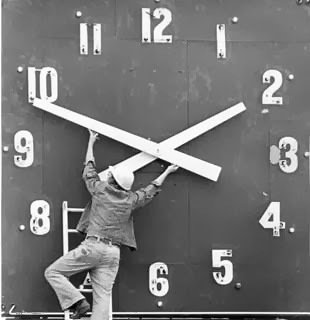 Back in 2010 I wrote this on my old (now defunct) blog:
Back in 2010 I wrote this on my old (now defunct) blog:(Some of the links don't work anymore)
Over the weekend we all (well most Americans and some Canadians) did our annual ritual of "springing forward" and turned our clocks one hour ahead. Daylight Saving Time (DST) was expanded in 2007 by a 2005 act of Congress in the hopes of saving energy. It doesn't save energy and in fact probably costs energy and you money. Laurent Belsie writing for the Christian Science Monitor's "The New Economy" blog tells about a study that shows DST is an energy and money waster:
The move to Daylight Saving actually used 1 percent more electricity than if people stuck to Standard Time, according to a 2008 study on residents in Indiana. In other areas of the United States, the time change could cost people even more.Indiana is a special case because a lot of the state didn't observe DST until recently.
While Indiana residents saved on lighting by switching to Daylight Saving Time, they spent even more on extra heat and air-conditioning.And if you live where it's colder or hotter than Indiana, you're probably spending more.
During the colder months of Daylight Saving, Indiana residents turned up the heat because they were getting up an hour closer to the coldest part of the night, the researchers found. In the summer months, they cranked up the air-conditioner because they were getting home an hour closer to the hottest part of the day.
The extra electricity cost for Daylight Saving: $3.29 per Indiana household per year or $9 million for the state as a whole.
But it's not only that DST doesn't save energy and does cost you money: it's dangerous, too. John Miller in a National Review Online piece tells how dangerous (link original):
According to Stanley Coren, a sleep expert at the University of British Columbia, the number of traffic accidents and fatal industrial mishaps increase on the Monday after we spring forward. (Check out one of his studies here.) The reason, presumably, is because losing even a single hour of sleep over the weekend makes a lot of people a bit drowsier on what we might usefully call Black Monday. Unfortunately, there's no compensating effect of a super-safe Monday as we go off DST and "fall back" in the autumn.Sounds like a typical government program: costs you money and is deadly.
Maybe the best idea would be to scrap the whole thing.
Published on March 09, 2014 11:20
March 3, 2014
Writing Requires Discipline
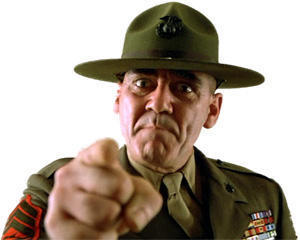 Why do you write? Ask fifty writers and you'll probably get fifty different answers. A lot of them will probably say they enjoy it and it's fun. And it is. As a writer I'm sure you don't stare at a computer screen, avoid all human contact, and risk carpal tunnel syndrome simply because it pays the bills (boy, it does not pay the bills, am I right?). You love it. You don't know what you'd do if you'd couldn't write.
Why do you write? Ask fifty writers and you'll probably get fifty different answers. A lot of them will probably say they enjoy it and it's fun. And it is. As a writer I'm sure you don't stare at a computer screen, avoid all human contact, and risk carpal tunnel syndrome simply because it pays the bills (boy, it does not pay the bills, am I right?). You love it. You don't know what you'd do if you'd couldn't write.But writing, at least professionally (and if you are selling books even as an indie, you are writing professionally) is a job. Sorry. And like all jobs, it has some unpleasant parts.
One thing I hear from a few would-be writers is "Oh, I've got a thousand things started but nothing's finished." Why don't they finish what they start? Because they get a new idea and start working on it. It's a lot funner to work on the new idea than to drudge through and get the previous idea finished. What these writers lack is discipline. And successful writing requires discipline.
For instance: I am currently working on a western/fantasy mashup that is in the same world as my Adept Series (the first novel of which is Hammer of Thor ). But last Tuesday as I was showering I had another idea for a science fiction novel. And I found myself writing scenes for it in my head and plotting it out. And I thought about a scene I had written many years ago, a vignette really, that I could incorporate into this novel. And . . . what about my western/fantasy? Well, I'm about 22,300 words into it (of a goal of 60,000) and it's sort of bogging down and I need to figure out some stuff and boy would it be more fun to work in the science fiction novel.
But I can't. I have to be disciplined. I have to finish the western/fantasy and then go back to the science fiction piece. So I wrote the first scene I had in mind for the science fiction novel, took some notes, did some preliminary calculations to see if I was out of my mind on the science, and now I'm setting it aside until I finish the western. Is that the funnest thing to do? No. Is it what's required. Yes, if I want to be a successful writer. It is what being disciplined means.
Being disciplined as a writer means you do the less-than-fun-stuff in addition to the fun stuff. You drive through and finish your current WIP before starting another. You get the edits done on your WIP before you work on your next project. You keep pushing and working on that novel until it is published. Yes, you might start a new WIP while you're waiting for beta reads or your publisher to get back to you with edits. But you keep working. As I said, writing is work; it is a job.
Because if you're not disciplined and you don't get the book finished and published, you aren't a writer, you're a tinkerer.
Published on March 03, 2014 05:00

